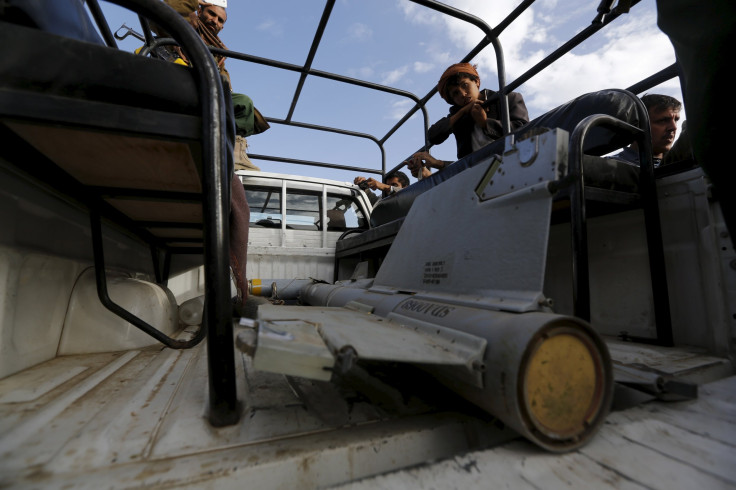Scud Missile Fired At Saudi Arabia As 38 Yemenis Reported Killed

Yemen's dominant Houthi group and its army allies fired a Scud missile at Saudi Arabia which the kingdom said it shot down on Saturday, in a major escalation of two months of war.
Arab airstrikes and shelling after the attack killed 38 Yemenis in provinces near Saudi Arabia, according to reports in the Houthi-controlled state news agency Saba which could not be immediately confirmed.
In the first reported use of a ballistic missile in the conflict, the Scud was fired on Saturday morning at the city of Khamees Mushait in the kingdom's southwest and was intercepted by two Patriot missiles, a statement by the Saudi military said.
The area is home to the largest air force base in southern Saudi Arabia, the world's top oil exporter, but there are no oil facilities in the vicinity.
Al Masira, the Houthi group's official channel, confirmed the launch and said it targeted the King Khaled air base.
An alliance of Gulf Arab nations has been bombing Yemen's Houthi militia and allied army units loyal to powerful ex-President Ali Abdullah Saleh since March 26 in an attempt to restore exiled President Abd-Rabbu Mansour Hadi to power.
Yemen's official Saba news outlet said Saudi shelling and airstrikes hit a camp for displaced people, a medical center and a school in the border province of Hajja, killing 28 people, and bombings elsewhere in the north killed 10 others.
It was not immediately possible to confirm the reports among residents of the remote border areas, which are cut off from telephone lines and are often the scene of clashes between Houthi and Saudi forces.
Saturday's violence came despite progress toward United Nations-backed peace talks planned for Geneva this month, to which both the exiled government and the Houthis have agreed.
The United Nations said on Saturday it would convene the talks on June 14, and renewed a call for a pause in hostilities. "This could also help create an atmosphere that is more conducive for peaceful dialogue," a spokesman said.
The coalition has said a main goal of its war effort is to neutralize the threat that rockets in Yemen pose to Saudi Arabia and its neighbors.
The alliance's spokesman, Saudi Brigadier General Ahmed Asseri, said in April that it had removed the threat from heavy weapons. He later appeared to step back from that assertion, saying that 80 percent of the 300 or so missiles had been destroyed - a figure he repeated on Saturday.
"Praise God, we have air defense forces capable of blocking these kinds of rockets, destroying them and thwarting attempts like this," he added.
The Sunni Muslim coalition states fear the Houthi movement, from a Shi'ite sect in north Yemen, will act as a proxy for their arch-rival in the region, Shiite Iran.
Iran and the Houthis deny any military or economic links, and the Houthis say their seizure of the capital Sanaa in September and their advance southward is part of a revolution against a corrupt government.
BORDER BATTLE
Arab air strikes have pounded arms and missile stores in the capital Sanaa and other military bases in Yemen almost daily.
The 11-metre-long (35-foot) Scuds have ranges of 300 km (200 miles) and more. The Cold War era ordnance has been used in internal conflicts in Syria and Libya and was fired by Saddam Hussein's Iraq at Saudi Arabia in the 1991 Gulf War.
Saleh, Yemen's autocrat president from 1978 to 2012, was forced to step down amid Arab Spring street protests but retains most of the army's loyalty and has joined forces with the Houthis in combat with Hadi's armed backers in Yemen's south.
His forces traded Scud missile fire with southern separatists in a 1994 civil war.
Al Arabiya TV described overnight ground fighting along the border as the largest attack yet by Houthi forces and Yemen's republican guard, a unit close to Saleh.
"It was the first confrontation undertaken by Saleh's (Republican) guard, and coalition planes and Saudi Apache (helicopters) undertook ground fire for 10 hours," said Al Arabiya's correspondent in the southern Jizan region.
Hamed al-Bukhaiti, a Houthi spokesman, indicated that the group was escalating attacks along the border. "We've only just begun, and next time will be stronger," he said on his Twitter page.
Saudi-led forces said on Friday that four Saudi soldiers, including two officers, were killed after an attack was launched from the Yemeni side on border areas in Jizan and Najran.
Residents in the southern city of Aden said heavy artillery battles resumed after a pause of several days on Saturday, in clashes which killed around 10 Houthi fighters and three pro-Hadi militiamen.
Ahead of the U.N. peace talks, a Houthi delegation left on Saturday for talks in Russia on the situation in Yemen, Houthi official Daifallah al-Shami said, without providing details.
Russia was the only country in the 15-member United Nations Security Council that abstained from a resolution in April calling on the group to recognize Hadi's authority and quit Yemen's main cities.
(Additional reporting by Michelle Nichols at the United Nations and Mostafa Hashem; Editing by William Hardy and Dominic Evans)
© Copyright Thomson Reuters {{Year}}. All rights reserved.





















